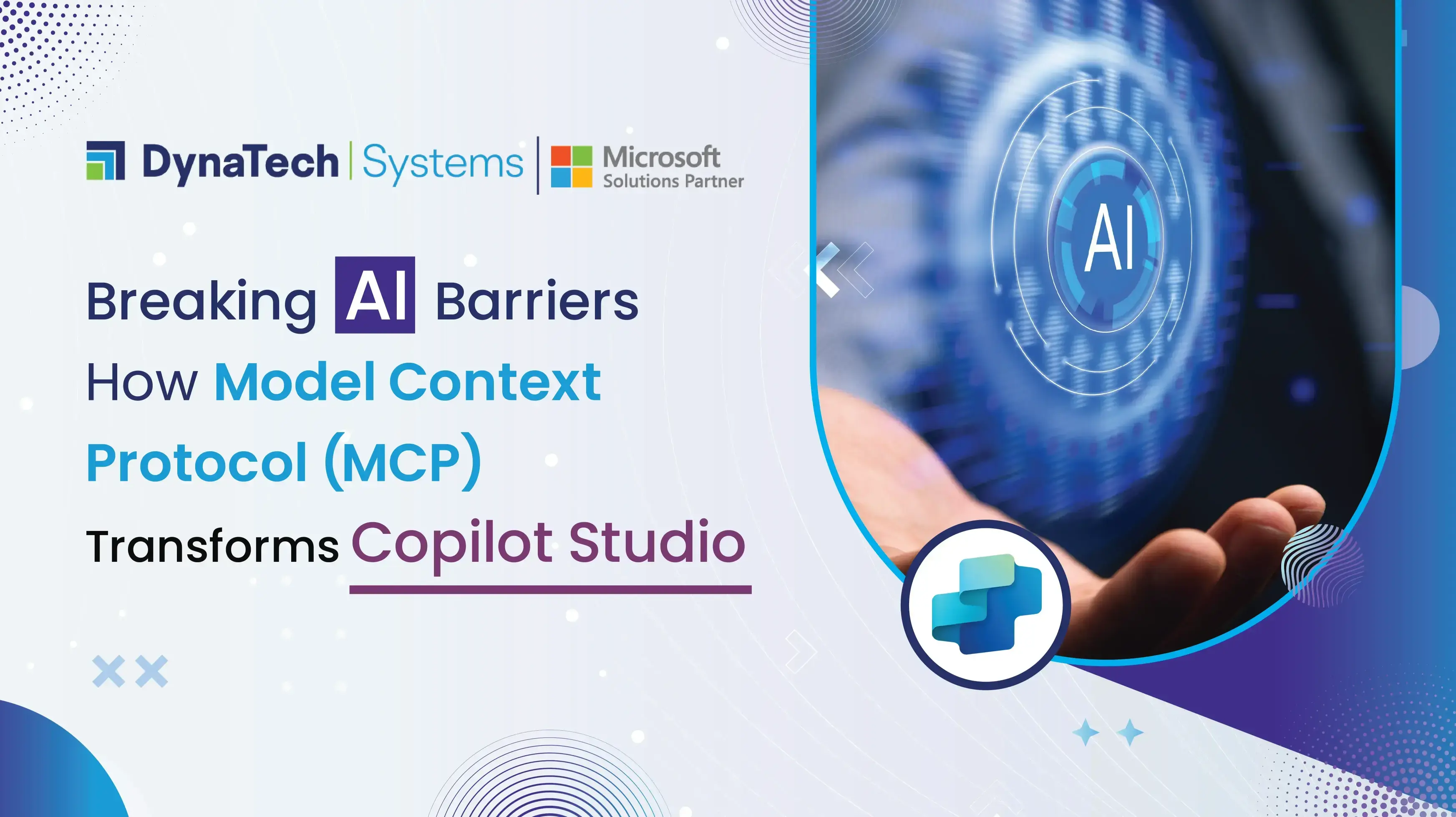Building an AI assistant that truly understands context has always been easier said than done. Most AI systems struggle because they rely on rigid integrations—requiring custom connectors, complex coding, and constant manual updates. The result? A slow, frustrating process that limits innovation.
But what if AI could access business data effortlessly, without all the technical hurdles?
That’s exactly what Model Context Protocol (MCP) makes possible. This new open standard allows AI models to pull in relevant information from both private and public sources seamlessly. And now that MCP is integrated into Microsoft 365 Copilot Studio, businesses can create more intuitive, responsive, and scalable AI solutions—without the usual headaches.
In this blog, we’ll unpack why MCP is such a big deal, how it simplifies AI development, and what it means for businesses looking to stay ahead. Let’s get into it.
Understanding the Model Context Protocol (MCP)
At its core, Model Context Protocol (MCP) is an open standard that makes it easier for AI assistants to connect with a wide range of data sources. Instead of relying on rigid integrations, MCP allows AI applications to intelligently access, retrieve, and process information from both private repositories and public web sources—all in real time.
The result? AI systems that are smarter, more responsive, and far more capable of delivering accurate insights without the usual technical roadblocks.
How MCP is Transforming Copilot Studio
Bringing AI assistants into the real world has always been tricky—especially when it comes to connecting them with the right data. Setting up integrations usually means dealing with custom connectors, endless configurations, and constant maintenance. It’s time-consuming, expensive, and frustrating.
But Model Context Protocol (MCP) changes the game. With MCP now part of Microsoft 365 Copilot Studio, AI assistants can seamlessly tap into enterprise data—without all the heavy lifting. Here’s why that’s a big deal:
1. Instant Access to Business Data—Without the Headaches
No more complex coding or workarounds. MCP lets AI assistants pull information directly from knowledge bases, internal databases, and document repositories—all in real time. That means businesses can build AI-powered agents that stay updated automatically, instead of relying on outdated static data.
2. A Built-In Marketplace of Ready-to-Use Connectors
Why build custom integrations from scratch when you don’t have to? MCP unlocks a growing library of pre-built connectors, making it easy to link Copilot Studio with the tools and platforms businesses already use. It’s a plug-and-play solution that saves time and effort.
3. Smarter AI That Adapts in Real-Time
AI isn’t just about answering questions—it’s about taking action. MCP allows AI agents to dynamically retrieve and use the right tools and data when needed, rather than relying on a pre-set list of actions. That means more intelligent, adaptable AI solutions with lower maintenance costs.
4. Enterprise-Grade Security, Built-In
Security is non-negotiable, and MCP is designed with enterprise protection in mind. It includes:
- Virtual Network (VNet) integration for secure data access
- Data Loss Prevention (DLP) controls to prevent leaks
- Multiple authentication methods to keep information safe
With these safeguards, businesses can trust that their AI-powered assistants are both powerful and secure without compromising sensitive data.
Why MCP is a Game-Changer for AI Integration
If you've ever tried to integrate AI into your business systems, you know it’s rarely a smooth process. There’s always some missing connection, a custom API that needs to be built, or a data source that doesn’t sync properly. Even after all the technical hurdles, AI models still struggle with stale or incomplete information, leading to frustratingly inaccurate results.
This is where the Model Context Protocol (MCP) comes in. Instead of forcing developers to create one-off fixes for every AI application, MCP acts as a universal language, allowing AI to instantly connect to both private and public data sources without a mess of custom code.
Let’s talk about why this actually matters:
1. No More Custom-Built Integrations
Right now, most businesses waste time and money hand-coding AI integrations from scratch. If a system update breaks a connection? More development work. If a new data source needs to be added? More coding. With MCP, those headaches disappear. It provides a standardized way for AI to access information, meaning companies can plug in new data sources without reinventing the wheel each time.
2. AI That Pulls Live, Real-Time Data
One of the biggest AI problems today? Outdated information. Many AI assistants rely on preloaded data sets instead of live sources, which means they’re often missing the most current insights. MCP solves this by letting AI systems tap into real-time data—whether from internal databases, cloud repositories, or public knowledge sources—so responses are always accurate and context-aware.
3. Built to Grow With Your Business
Technology moves fast, and AI should be able to scale alongside your business. MCP makes that possible. Need to integrate a new tool? Add an extra data source? Expand AI capabilities across different departments. With MCP, businesses can scale AI effortlessly without having to re-engineer their entire tech stack.
Getting Started with MCP in Copilot Studio
Integrating Model Context Protocol (MCP) into Copilot Studio is a simple yet powerful way to enhance AI-driven workflows. Here’s how you can set it up:
1. Build Your MCP Server
The first step is to set up an MCP server that acts as a central hub for your data sources. Using Microsoft’s SDKs, developers can configure the server to pull, process, and deliver relevant information to AI models in real time.
2. How to Connect MCP to Copilot Studio
Once your MCP server is ready, the next step is getting it to work with Copilot Studio. Instead of dealing with complicated coding or endless setups, you just need a custom connector. This acts like a direct link between your AI assistant and your business data, ensuring that Copilot Studio can pull in relevant information when and where it’s needed—without constant manual updates or extra hassle.
3. Making MCP Work for You
With the connection in place, your AI assistant becomes a lot smarter and more responsive. Instead of relying on outdated or preloaded data, it can now fetch real-time insights on demand. This makes a huge difference for businesses that need fast, accurate, and context-aware AI responses.
The best part? You save time and effort. No more building complex API integrations from scratch. No more struggling with maintenance. Just seamless AI-powered efficiency that works right out of the box.
What’s Next for AI in Your Business?
AI is evolving fast, and with Model Context Protocol (MCP) now part of Microsoft 365 Copilot Studio, businesses have a real opportunity to make AI work without the usual headaches. No more struggling with integrations, no more messy coding—just straightforward, secure access to the data your AI needs.
At DynaTech Systems being a Microsoft Solutions Partner, we don’t just talk about AI—we help businesses put it to work. Whether you’re using Microsoft Dynamics 365, Power Platform, or Azure Cloud, we’ll make sure AI fits seamlessly into your workflows so you can focus on what really matters—running your business smarter and faster.
Let’s make AI work for you. Reach out to us today and let’s start building a smarter future for your business.




























